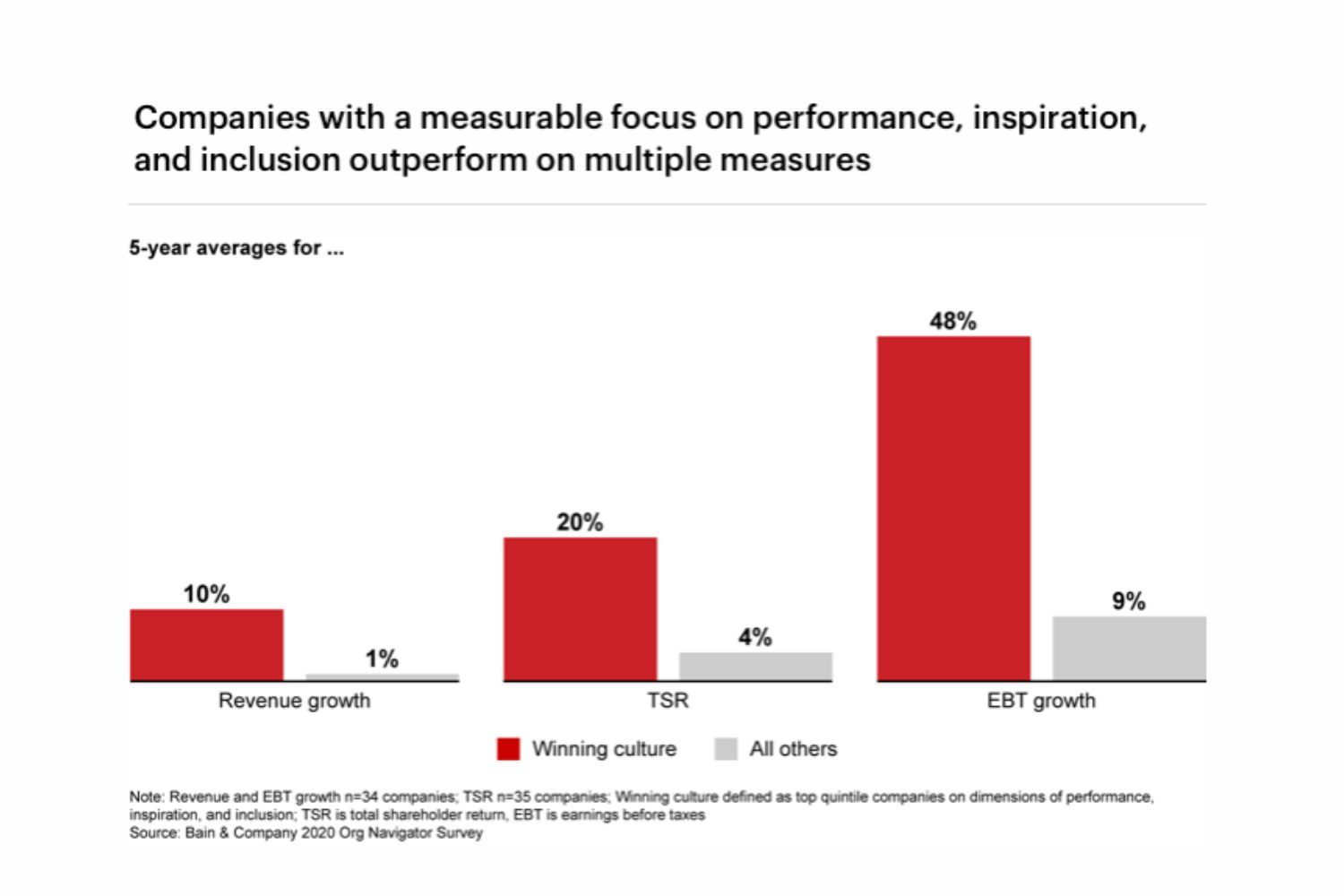Leadership Insights
The Workplace Revolution: Trends and Opportunities

A high-performance culture is a key differentiator for exceptional organisations, and companies are waking up to its importance. To stay ahead of the curve, businesses are proactively implementing cultural transformation strategies that prioritise employee wellbeing and inspiration, recognising that success is not just about products or services, but about the culture that defines them.
The Dual Impact of a Positive Work Culture
By fostering a positive work environment, organisations can achieve a dual impact:
Improved Employee Output and Retention: A culture of wellbeing and inspiration leads to higher employee engagement, productivity, and retention.
Increased Customer Satisfaction and Business Success: A positive work culture translates to better customer experiences, driving business growth and success.
A Positive Ripple Effect
This, in turn, creates a positive ripple effect that extends beyond organisational boundaries, contributing to a more vibrant and thriving business ecosystem. As the modern workplace continues to evolve, prioritising culture is no longer a nicety but a necessity for sustained success.

Companies are leveraging advanced analytics and digital technologies to gain deeper insights into employee sentiment and customer behaviour, enabling more targeted interventions and personalized experiences.
While these efforts are laudable, the importance of cultivating a robust culture often falls on the shoulders of their leaders. Many companies acknowledge the significance of fostering a strong culture, yet the challenge lies in translating this recognition into actionable strategies. A recurring question arises: What steps can leaders take to establish a high-performance culture?
The Power of High-Performance Culture and Modern Leadership
This shift towards prioritising a high-performance culture stems from the recognition that traditional approaches are no longer sufficient to meet the demands of the modern business environment. To effectively embody this identity, organisations must adopt modern leadership practices that empower employees and foster innovation. Embracing this concept requires organisations to go beyond superficial changes and fundamentally transform their operations, structures, and mindsets. It necessitates a shift towards modern leadership practices that prioritise transparency, inclusivity, and empowerment, enabling employees to unleash their full potential and drive organisational success.
"Instead of offering dictates, the leader began meeting with the team, listening to their thoughts, offering feedback to the team and then collaborating to execute their goals. In a short period of time, the company boosted revenue and surpassed strategic goals."
Here's a breakdown of the latest insights and practices for success:
Emphasis on Emotional Intelligence
Modern leaders are expected to have high emotional intelligence (EQ) as a powerful asset that affects performance and outcome. A core value highlighted in all leadership search assignments is that of understanding and managing one's emotions and empathising with others - it is a behaviour that effectively contributes to a high-performance culture. In a study conducted by TalentSmartEQ, emotional intelligence was evaluated alongside 33 other crucial workplace skills. The findings revealed that emotional intelligence emerged as the most influential predictor of performance, accounting for a substantial 58% of success across various job roles.
Diversity, Equity, and Inclusion (DEI)
Whether at the Board or organisational level, a diverse team brings a variety of perspectives and ideas, fostering innovation and creativity. Moreover, inclusive practices within diverse teams ensure that every member feels respected, valued, and empowered to contribute fully. When individuals feel comfortable expressing their opinions and ideas, they're more likely to share innovative insights and collaborate effectively.
A report by McKinsey & Company found that diverse companies perform better, especially if an organisation's leadership is diverse.

Continuous Learning and Adaptability
The rapid pace of change in today's business environment necessitates organisations and their leaders to be highly adaptable and committed to continuous learning. Leaders who seize the opportunity to stay abreast of industry trends, technological advancements, and changing consumer behaviours not only position their organisations for success but also foster a culture of growth and development among their employees. By prioritising continuous learning, leaders create an environment where employees feel empowered to enhance their skills and knowledge, leading to increased job satisfaction and career advancement opportunities. LinkedIn's Workplace Learning Report underscores this, revealing that 94% of employees value career development, indicating its pivotal role in retaining top talent.
Wellness and Work-Life Balance
Modern organisations are recognising the significance of mental and physical health in achieving top-notch performance, and beyond post-pandemic, making a conscious effort to prioritise wellbeing, and that includes flexible working arrangements. It has become increasingly standard. Investing in mental health interventions not only enhances productivity but also yields a significant return on investment, as evidenced by the World Health Organization's findings.
Feedback and Communication
Open and transparent communication is critical to building trust within teams and across the organisation. Modern leadership involves providing constructive feedback that encourages growth and development rather than discouraging effort. Make it amplify needs and commitment for an ultimate 360 satisfaction. Gallup's survey underscores this, revealing that employees receiving regular feedback are three times more likely to be engaged at work.
Purpose-Driven Leadership
Leaders who can articulate a clear vision and demonstrate how each team member's work contributes to the organisation's goals are likelier to cultivate a highly engaged and high-performing team performing team. As corroborated by Deloitte's research on purpose-driven companies, leaders instilling a sense of purpose witness heightened employee satisfaction and loyalty.
Leveraging Technology
Modern leadership also means leveraging technology to enhance performance and productivity. AI has arrived and is the talk of the town for data analytics, decision-making, collaboration, and automating routine tasks. Every aspect of our lives is affected and is here to stay. McKinsey's report underscores the transformative potential of digital technologies, with companies embracing them experiencing up to a 60% increase in productivity.
Sustainability and Social Responsibility
Companies that demonstrate respect through commitment to sustainability and social responsibility are the real winners and contribute positively to society and inspire their employees - a powerful metaphor for high performance. Many studies show consumers' willingness to pay a premium for products and services from socially responsible companies, emphasising their significant market appeal.
In the contemporary business world, fostering a high-performance culture is essential for organisational success, and effective leadership is the fundamental pillar upon which thriving businesses are built.
Unlock the Full Potential of your Organisation
Contact our experts who understand the nuances of cultivating a high-performance culture and redefining leadership approaches.